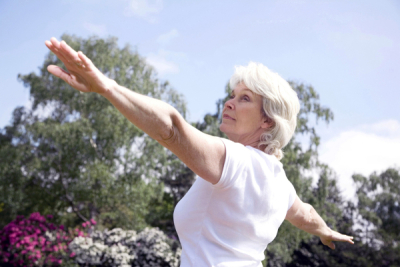As we grow older, we are motivated to seek experiences that promote well-being. When it comes to deciding whether to move to a senior living community, something more is at stake than meeting basic needs of shelter and health care. A recent Mather LifeWays survey, “The Senior Living Experience,” points to people being drawn to CCRCs because of the “assurance that they can continue living in the same community if and when health needs change.”2
That finding underscores the difference between features and benefits: As vital members of a community, we really desire the benefits of assurance, security and peace of mind. Moreover, each of us seeks transformation, or, to use Abraham Maslow’s term, “self-actualization,” the apex in Maslow’s hierarchy of needs. As older adults we want an experience that fulfills us in some profound way. At Paintbrush Assisted Living and Memory Care, our mission is to facilitate these individual searches of well-being in the broadest sense.
Interest in well-being has grown in recent years as research and programs in “successful aging,” “active aging” and “person-centered care” have broadened our view of older adults’ needs and aspirations. As we seek to learn more about the senior experience, we look at various models for wellbeing. Carol Ryff’s model for psychological well-being has six dimensions3:
- Self-acceptance: Ryff describes this as “acceptance of self and of one’s past life” and “holding positive attitudes toward oneself.”4 An older adult can have a sense of confidence even when physical capacity is diminished.
- Positive relationships with other people: Relationships are a critical factor in successful aging, say researchers.
- Autonomy: Freedom and independence are vitally important to older adults.
- Environmental mastery: Similar to autonomy, this dimension is about one’s sense of control over his or her place or life setting.
- Purpose in life: Purpose applies to everyone, regardless of physical health or cognitive ability. Indeed, research shows that maintaining a high level of purpose in life can even “alleviate some of the challenges people with dementia experience as their cognitive or physical capacities are compromised,” says researcher Wingyun Mak.5
- Personal growth. This dimension, says Ryff, is about continuing to “develop one’s potential, to grow and expand as a person.”6
Ryff sums up well-being in this way: “Taken together, these six dimensions encompass a breadth of wellness that includes positive evaluations of one’s self and one’s life, a sense of continued growth and development as a person, the belief that life is purposeful and meaningful, the possession of good relationships with other people, the capacity to manage one’s life and the surrounding world effectively, and a sense of self-determination.”7
At Paintbrush, we look to our residents for help in defining “successful aging”. We have found that older adults place a heavy emphasis on self-determination.8 When moving into a senior living community, older adults do not want to sacrifice their freedom. They want to expand it. They want to make their own choices.
According to researcher Valerie McCarthy, older adults successfully age first through adaptation, a kind of negotiation with the environment or coping strategy that enhances “their ability to survive and thrive”9; then finally through transcendence, which, McCarthy says, can lead to “the kind of successful aging that doesn’t go away just
The move to assisted living or even to memory care is a great opportunity to reinvent one’s self. If you have always wanted to dance, write poetry, make art or just be a little different from what you always have been, we are here to support you in that journey.
We use the hospitality metaphor of hotels to get at the quality of service we offer. But the more fitting metaphor might be adventure travel – the active engagement of our residents in shaping their own experience.
Read The Entire “The Senior Living Experience” Series!
Part 1 – Introduction
Part 2 – Moving to an Experience-Based Model
Part 3 – In Search of Well-Being
Part 4 – Co-Creating Experiences
Part 5 – Implications of Senior Living Communities
Footnotes
2. “The National Survey of Family Members of Residents Living in CCRCs,” summary published by Mather LifeWays, Ziegler and Brecht Associates, Inc., Feb. 1, 2012, 4.
3. Carol D. Ryff, “Psychological Well-Being in Adult Life,” Current Directions in Psychological Science, August 1995, 99-104.
4. Carol D. Ryff, “Happiness Is Everything, or Is It? Explorations on the Meaning of Psychological Well-Being,” Journal of Personality and Social Psychology, 1989, Vol. 57, No. 6, 1071.
5. Wingyun Mak, “Beyond the Observable: Examining Self-Reported Well-Being in People with Dementia,” dissertation, August 2009, 72.
6. Ryff, “Happiness Is Everything, or Is It? Explorations on the Meaning of Psychological Well-Being,” 1071.
7. Ryff, “Psychological Well-Being in Adult Life,” 99.
8. Valerie Lander McCarthy, “A New Look at Successful Aging: Exploring a Mid-Range Nursing Theory Among Older Adults in a Low-Income Retirement Community,” The Journal of Theory Construction & Testing, April 2011, 18.
9. Ibid.
10. Valerie Lander McCarthy, “Successful Aging Research,” video by University of Louisville, retrieved on Sept. 16, 2012, from http://www.youtube.com/watch?v=cLRrm0knVyk&lr=1&uid=UJOhNXYFGHDSJNTMdV95kQ.

